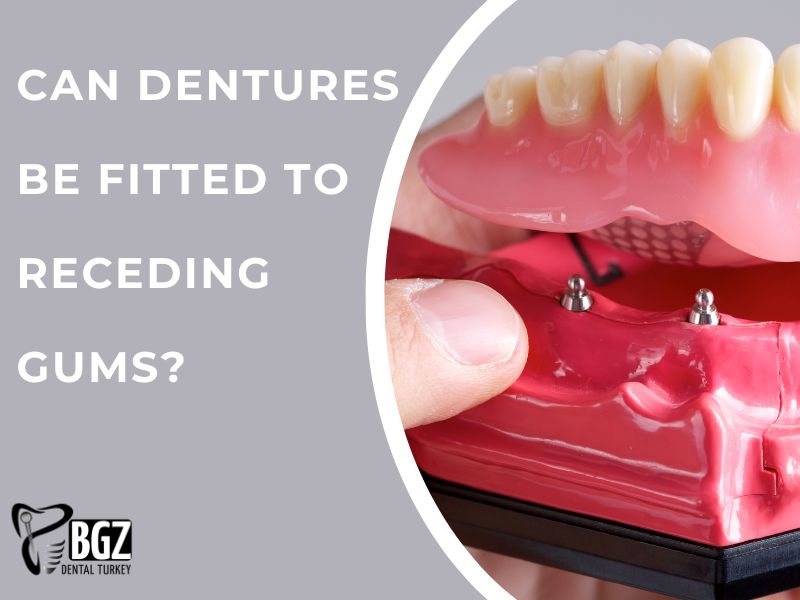
Gum recession is a major concern for many people, both in terms of aesthetics and health. Not only can it affect your smile, but it can also negatively affect your oral health. However, there is a common misunderstanding about whether it is possible for people with receding gums to wear dentures. Generally, receding gums do not preclude the use of dentures. In fact, properly designed dentures can offer an ideal solution for people with this condition. In summary, the answer to the question 'Can Dentures Be Fitted To Receding Gums is yes. However, there are some important factors to consider to achieve the best result.
Causes of gum recession?
Hard and incorrect tooth brushing: It can occur due to double-sided hard brushing in horizontal or vertical direction or the use of hard-bristled toothbrushes.
Presence of plaque and tartar: Plaque and tartar are easily formed in individuals who do not pay attention to oral hygiene. This causes gingival recession and periodontal diseases.
Occlusal trauma: It means the occurrence of compression that damages the teeth when the teeth close. This situation, which occurs especially in individuals with teeth clenching and grinding problems, also occurs in high filling or bite disorders.
Tooth crowding: In case of severe crowding of the front teeth, gingival recession may be encountered.
Smoking and use of tobacco products: It is one of the other factors that adversely affect gum health. The effect of smoking on the bones surrounding the gums and teeth is quite serious. The damage caused by smoking follows an insidious course and may occur suddenly.
Lip and tongue piercings: It can cause trauma on the gums and therefore recession of the gums.
Genetics: Some people are genetically more prone to gum recession than others. In addition, hormonal changes caused by pregnancy and menopause in women can cause receding gums.
What is the effect of gum recession on dentures?
Gum recession occurs when the gums around the teeth recede, exposing the tooth roots. This can cause significant functional as well as aesthetic problems. The effect of gum recession on dental prostheses manifests itself in several different ways. Here are the effects of gum recession on dental prostheses:
Improper Fit of Dentures
With gum recession, it can be difficult for dentures to fit properly due to the loss of support in the gums. The receding gums leave less surface area around the teeth, making it difficult for the dentures to hold on. This can cause the dentures to become loose and move over time. Slipping dentures make daily activities such as eating, speaking and smiling difficult.
Discomfort and Irritation
As a result of gum recession, dentures are placed closer to the gums, which can often cause irritation, sores or pain. Dentures can put pressure on the gums and strain them, which can lead to inflammation or sores on the gums. This discomfort can be especially pronounced when new dentures are fitted, due to misalignment.
Bone Loss and Jaw Changes
Gum recession often leads to changes in the jawbone. The receding gums can cause the jawbone to lose its strength over time, because the loss or displacement of teeth reduces the pressure on the jawbone. This bone loss can make the fit of dentures more difficult. As gum recession progresses, these changes in the jaw structure can lead to further loosening of the dentures.
More Pressure and Uneven Distribution
When dentures do not fit properly, more pressure is created in the mouth. In areas where the gums recede, the dentures are likely to put uneven pressure on the jawbone. This can accelerate bone loss and negatively affect the jaw structure. At the same time, uncomfortable spots may form in the mouth, which can make it difficult to use dentures in the long term.
Need for More Frequent Adjustment and Refilling
As gum recession progresses, dentures may need to be readjusted frequently. As the shape of the gums changes, the lower part of the dentures may not remain compatible. For this reason, the lower part of the dentures may need to be renewed or relining (re-filling). This procedure adds a new material to the lower part of the denture, allowing the dentures to fit better.
Solution Suggestions
Denture wearers with receding gums can face some challenges in terms of both comfort and oral health. However, there are various solutions to manage this situation and ensure a comfortable use:
1. Checking Denture Fit
- Gum recession can impair the fit of the prosthesis over time. For this reason:
- Regular dental check-ups should be carried out to assess whether the prosthesis is suitable for the mouth structure.
- Gaps can be eliminated by relining under the prosthesis.
- In case of excessive shrinkage, it may be necessary to have a new prosthesis.
2. Use of Denture Adhesives
Gum recession can reduce the retention of the denture. Denture adhesives with strong retention properties increase the stability of the prosthesis and reduce discomfort.
3. Use of Soft Liner Material
When the gums recede, the hard surface of the denture can cause irritation. Soft liners are added to the inner surface of the prosthesis to provide cushioning and reduce pain.
4. Gum Care and Supportive Treatments
Antiseptic mouthwashes and soft toothbrushes should be used to maintain gum health.
5. Transition to Implant Supported Prostheses
If gum recession is advanced and the use of dentures becomes difficult, implant-supported dentures may be a better alternative. These prostheses reduce pressure on receding gums and provide a more stable use.
6. Paying attention to nutrition
Denture wearers with receding gums should avoid hard and sticky foods and consume foods that support gum health, such as vitamin C and coenzyme Q10.
With regular care and appropriate solutions, denture wearers with receding gums can have a more comfortable and healthy experience. If the discomfort persists, a consultation with a dentist would be the best step.
With our guaranteed treatments, we are always here for you.
Don’t hesitate to contact us, We will be happy to help anytime.



